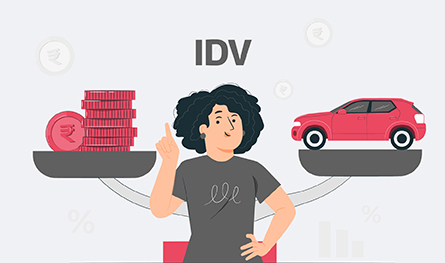What is IDV in Car Insurance and How to Calculate IDV for Four-Wheeler and It’s Affect on Claims

IDV or Insured Declared Value is the feature that determines the coverage value or the current market value of your vehicle, which in turn determines the premium of your car insurance policy. The IDV also determines the maximum sum of money that a policyholder can receive in case the vehicle gets stolen. Read more in this post.

What is the Insured Declared Value (IDV) in Car Insurance and How to Calculate IDV for Car Insurance?
Insured Declared Value (IDV) is actually the current market price of your car adjusted with depreciation for the age of your car. So, stated simply, the formula for IDV is :
IDV = Current Market Price of the Car – the relevant depreciation based on the age of the car
The rate of depreciation increases with an increase in the age of the car. The applicable rate of depreciation is as follows :
| Age of the car | Rate of depreciation |
| Up to 6 months | 5% |
| Above 6 months but up to 1 year | 15% |
| Above 1 year but up to 2 years | 20% |
| Above 2 years but up to 3 years | 30% |
| Above 3 years but up to 4 years | 40% |
| Above 4 years but up to 5 years | 50% |
Let’s understand the calculation of IDV with the help of an example :
| Cost of the car bought 3 years ago | Rs. 7 lakhs |
| Age of the car | 3 years |
| Applicable depreciation | 30% |
| Current market price of the same car | Rs. 7.5 lakhs |
| IDV | Rs. 7.5 lakhs – 30% of Rs. 7.5 lakhs = Rs. 5.25 lakhs |
Though the actual cost of the car was Rs.7 lakhs, to calculate IDV, the current selling price of the car is adjusted for the relevant rate of depreciation.
Important Features of IDV
There are some points regarding IDV which you should know to understand it better. Here are such points :
Insurers compute IDV as a standard average value across the country, for ease of operations. IDV varies across insurers. Though IDV is computed based on the current selling price of the car, insurers adopt a standard value when computing the IDV. Since different insurers adopt a different value, the IDV differs among them.
You, as a policyholder, can negotiate the IDV with the insurance company. You can get the insurer to increase the IDV based on the currents selling price of your car.
IDV also varies across states because the applicable taxes are different across different states. These taxes influence the selling price of the car which in turn influences the IDV.
The applicable rate of depreciation is available only for cars up to 5 years old. If the car is older than 5 years, you, the policyholder, would have to negotiate with the insurance company and fix an IDV for your car on mutual agreement.
In IDV computations, the registration cost of the vehicle and the insurance cost are not taken into consideration.
The IDV of accessories, whose values are not included in the selling price of the car, would be calculated separately. This IDV would then be added with the car’s IDV to arrive at the applicable IDV.
The premium of your car primarily depends on the car’s IDV.
How Does IDV Affect Claims?
The Insured Declared Value (IDV) is relevant in case of theft of your vehicle or in case of a total loss. Let’s see how :
Theft of your vehicle
In case of theft of your car, the insurance company is liable to pay the applicable IDV of your vehicle. If, during any policy year, your car gets stolen and is not recovered, the IDV of the policy as in that policy year is payable as motor insurance claim.
Total loss of your vehicle
If your vehicle is badly damaged and the cost of repairs exceeds 70% of your IDV, it is called a total loss. In case of such total loss, the claim payable would be the IDV after deducting the wreck value of the car. The wreck value is the salvage value of your damaged car. Since a car insurance policy is an indemnity policy, the wreck value is deducted from the IDV and then the claim is paid.
So, the IDV is, in essence, the Sum Assured of your car insurance policy. It affects the claim amount in case of theft or total loss. So, you should select a higher IDV for your car to protect its value.
Choose wisely!
Found this post informational? Browse PayBima Blogs to read interesting posts related to Health Insurance, Car Insurance, Bike Insurance, Term Life Insurance and Investment section. You can visit PayBima to Buy Insurance Online.

Author Bio
Paybima Team
Paybima is an Indian insurance aggregator on a mission to make insurance simple for people. Paybima is the Digital arm of the already established and trusted Mahindra Insurance Brokers Ltd., a reputed name in the insurance broking industry with 17 years of experience. Paybima promises you the easy-to-access online platform to buy insurance policies, and also extend their unrelented assistance with all your policy related queries and services.
Other Motor Insurance Products
Latest Post
So, you’ve crossed the fabulous 60 mark. Retirement may be on the cards, your kids might be off doing their own thing, and suddenly your knees are making more noise than your WhatsApp notifications. Welcome to the senior citizen club.
Now let’s talk about something most of us tend to postpone until a doctor gives us a reality check: health insurance. If you are wondering whether buying health insurance after 60 makes sense, the answer is a loud and clear yes. This article will cover everything you need to know about it, how it makes sense, how it differs from health insurance for young adults, and what you need to look out for when checking for medical insurance above the age of 60.

.png)
April 2 is observed as World Autism Awareness Day and there is no better way to observe the day than to raise awareness of this condition and to promote kindness towards autistic people. Read on to know more.


Car depreciation implies the difference between the cost of a car at the time of buying the car and when you sell it. A car insurance claim amount is determined by the car depreciation rate. The car depreciation rate is the reduction in the value of your car over its lifespan caused by wear and tear.


Fixed Deposits (FDs) are one of the safest ways to grow your savings. HDFC Bank offers attractive FD interest rates, allowing you to earn guaranteed returns on your investment. But before you invest, it's important to know how much interest you will earn and what your final maturity amount will be.


If you think of life insurance, chances are you are picturing something people buy in their 30s or 40s. But what if you are 65 or older and just getting started? The good news is that you are never too late. Whether you are thinking of easing the financial burden on your family, covering final expenses, or simply leaving behind a legacy, there are life insurance options tailored just for you.
This article will be a guide to life insurance for senior citizens above 65 years, explaining why it is important, the type of insurance options, and how to get the right policy for you.






 Car Insurance
Car Insurance
